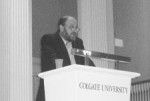Flannery Heats up Chapel

Dr. Tim Flannery came to Colgate on October 21, however, without the trademark explorer’s hat he is pictured wearing on the inside back cover of his bestselling book, The Weather Makers. He spoke to a packed Memorial Chapel about the topic of this book: global climate change.
Flannery, who is currently the chairman of the Copenhagen Climate Council and the 2007 Australian of the Year, was asked to speak because of his research and his book, The Weather Makers, which was the assigned summer reading for the class of 2011. Dean of First-Year Students Beverly Low and Provost and Dean of the Faculty Lyle Roelofs chaired the committee to select the book.
“Two summers ago I saw Al Gore’s movie, An Inconvenient Truth, and started reading The Weather Makers,” Professor of Geology and Presidential Scholar Connie Soja, another key player in the decision to assign the book to incoming first-years, said. “The two complemented each other in such significant and profound ways, it was as if two hands were being offered as gestures of good will, asking us to recognize the impact each of us is having on the Earth’s environmental future.”
The book, published in 2005, describes the causes of climate change, the steps necessary to stop it and the global causes of inertia on the matter. Flannery was both “honored and worried” that his book was mandatory reading.
“When something is mandatory more people are bound to resent it,” Flannery said. “However, it is good overall and helps the growing awareness of the big challenge we are going to face.”
Flannery was greeted with roaring applause from the audience. To the surprise of many and the relief of some, this was not a science lecture, but rather a comprehensive evaluation of the historical significance of the current climate problem and instances in the past in which mankind has risen to overcome similar challenges.
“Our history has been one of a ceaseless fight against pollution,” he said as he began to describe the cholera epidemic in London, England in the 1800’s and the unprecedented response to it: the creation of the London sewage system.
To further put things into perspective for the audience, Flannery compared the atmosphere with the ocean.
“[Humans] are as dependent on the [atmosphere] as fish are to the sea,” Flannery said. “The atmosphere is one-five-hundredth the size of the ocean and with all of the abuse that mankind has heaped upon the ocean, the seas have not turned toxic, but we have had air crises.”
He was referring to the acid rain caused by fossil fuel with sulfur content and the depletion of the ozone layer caused by the use of chlorofluorocarbons (CFCs) — the chemicals found in aerosols.
“Worldwide regulations have put an end to these problems and it is time for a worldwide treaty to work with the greenhouse gases.” He emphasized both the need to stop putting greenhouse gases, especially carbon dioxide, into the air and to start taking them out.
The gases, measured in parts per 10,000, were at a level of three at the beginning of the industrial revolution and are currently somewhere around four and a half. If the level reaches six, Flannery said, there would be tremendous issues.
“Greenhouse gases are necessary because if there were none present in the atmosphere the planet would freeze, but if there are too many then the planet would boil,” Flannery cautioned.
“The issue of the nineteenth century was social justice: slavery, child labor, work place condition, and women’s rights,” Flannery said. “Against the odds, society made reforms. The issue of the twentieth century was weapons and protection from them. The U.N. was formed and countries made anti-ballistic missile treaties. The issue of the twenty-first century is the environment and we must regulate the global commons.”
Flannery believes that mankind will rise to the challenge and make the necessary regulations to stop the negative effects of climate change.
After the lecture, Flannery signed copies of his book and spoke with students.
“[Flannery] is interestingly optimistic in the face of this crisis,” senior Doug Collins said of the lecture. “It is amazing how he can take such a hopeful stance for humanity.”
Of Colgate University specifically, Flannery was encouraged by the level of awareness, but said, “I was shocked to learn that the new Ho Science Center is not an accredited ‘green’ building. Students should be outraged that their university is wasting its money like this.”
There currently are many groups on campus that have put forth initiatives like last year’s carbon offsets table at the O’Connor Campus Center, but many feel that enough is not being done.
“People are not apathetic, but they’re just doing so many things that it is difficult for groups to get specific initiatives accomplished,” Professor of Economics and Environmental Studies Bob Turner said.






